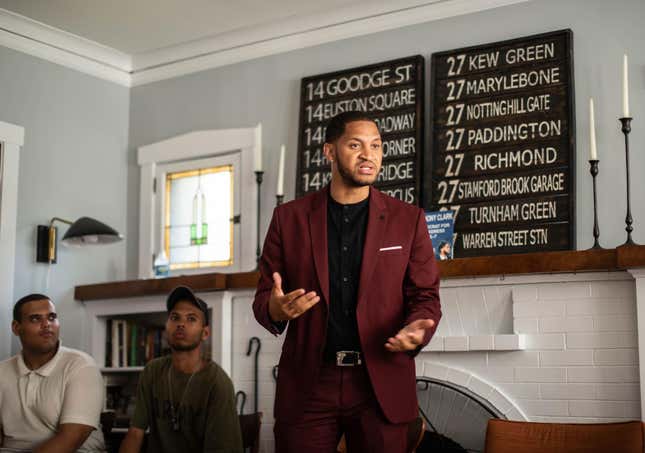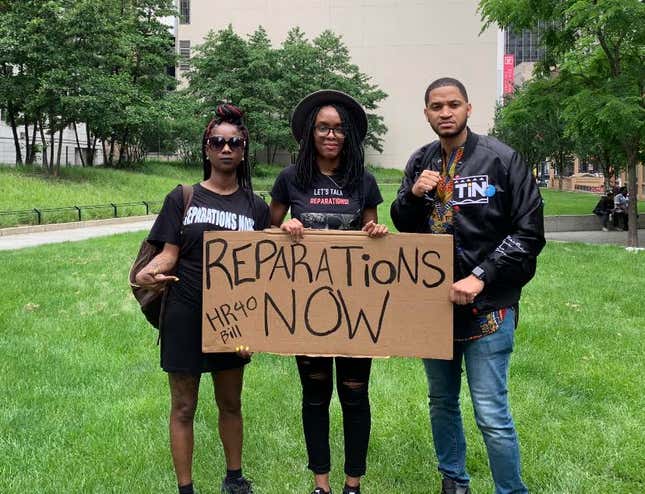
Does a radical political outsider have a legitimate shot of upsetting local incumbent U.S. Rep. Danny Davis? Ask any insider on the ground and they’ll tell you it’ll be an uphill battle. But Anthony V. Clark, a special education teacher and a U.S. Air Force veteran with colorful language to boot, tried to do in Chicago in 2018 what Alexandria Ocasio-Cortez did in the Bronx and Queens and what Ayanna Pressley did in Boston: pull an upset against a well-liked incumbent.
It didn’t work.
Davis won easily with more than 70 percent of the vote in the Democratic primary of the 2018 midterms for Illinois’ 7th congressional seat, but that figure isn’t as lopsided as it seems. With little money or a real campaign apparatus, Clark and his scrappy group of volunteers somehow managed to come away with nearly 30 percent of the primary vote, a very respectable haul, local analysts say, for a political neophyte.
During our conversation at a South Side bar earlier this year, Clark, 37, told me he’s better prepared to actually win this go-around.
“I didn’t know what the fuck I was doing,” he told me over drinks reflecting on his 2018 primary race. “We grinded last time, but we didn’t have a direction. We did zero mailers, we really didn’t track our door knocking, we didn’t follow up, we didn’t strategically push our message out.”
Across the nation, Democratic candidates like Clark—those who feel the party has become too neo-liberal in its thinking and complacent in its activism—are trying to shake up and unseat incumbents they feel have forgotten the poor and marginalized communities that helped them win their offices. Their message has been simple: if new blood doesn’t take over, poor and marginalized peoples’ lives will only get worse.
Clark’s hoping the 2018 energy that swept in a new crop of liberal lawmakers skeptical of the system will take him over the top in 2020. For him, that means moving the national conversation around Ukraine and Russia back to local issues. He says he understands the need to focus on international issues but argues the current news cycle has left people he wants to serve feeling ignored. They can’t think about Russian interference when they’re worried about their next meal or if they will be shot walking home from work or feel disenfranchised from participating in the electoral process.

As far as Clark is concerned, those very local issues are of national concern and addressing them from Washington is just as important as what is happening in the Kremlin.
“You really think they give a fuck what’s going on with Russia right now?” Clark asked.
Clark’s observations about the state of politics aren’t just focused on how distracted he thinks Washington lawmakers are. He feels there is little difference between the Republican and Democratic parties.
“They just present different optics and strategies and rules,” he said. “The Democratic Party benefits from white supremacy and suppression, just as the Republican Party does. And the incumbent (Davis) does as well. We have a lack of order in education in our communities. We have voter suppression in our communities. We have low voter turnout and the incumbent benefits from that because all they have to count on are the older voters and that church base to push them through to the next election cycle.”
His platform matches the fervor of his politics. Staunchly anti-war, he wants to see an end to private prisons, views housing as a human right and has called for an assault rifle ban. And Clark may be one of the few candidates who is running on a sex-work decriminalization platform. For him, sex-work decriminalization should be a top criminal justice issue for black people because black women are subject to being victimized by punitive responses in ways other communities are not. He explains that people, incorrectly, conflate sex trafficking with sex work, which does more to harm black women than help them because it criminalizes women who make the choice to use their bodies to make an honest living with people who are forced into the sex trade against their will.
“They are using sex trafficking to attack primarily black women, black trans women and other women in the sex work industry,” he said. “It’s not about sex trafficking but they pinpoint it because it is something the public cares about. What the community and the public don’t understand is if you move beyond symptoms and start looking at root causes of why are individuals sex trafficked, it is because of the fuckin’ poverty that exists in other nations, because of the poverty that exists in our fuckin’ country. Because of the high levels of homophobia, domestic abuse, many people are trying to escape their situations. So instead of trying to address homelessness and poverty and hate, we attack sex work by calling it sex trafficking”
Clark is one of a growing number of far-left candidates nationally who are taking on long-time Democrats in primaries because they feel incumbents have gotten too comfortable in their positions and have become the power structure they are supposed to hold accountable.
In 2020, Clarke is focusing on getting better name recognition. He claims Davis told him that’s how he’d win the 2018 race when they ran into each other campaigning.
“(He) looked me in my face last election cycle and literally said to me, ‘I’m not going to win because I’m better than you. I’m going to win because I have 30 years of name recognition.’ He told me that, literally.”
Ira Cohen, Davis’ director of issues and communications, told The Root that he would not comment on Clark’s run or respond to his statements about the congressman beyond saying that Davis has “always run on issues and I think he is proud of the fact that he’s always been one of the leading, independent voices in the city of Chicago when he was on the city council or the Cook County board and now the voice he brings to the United States Congress.”

Clark never thought about running for office until he was nominated, in 2018, by Justice Democrats and Brand New Congress as a result of his activism in Oak Park, a small town just outside of Chicago. Back in 2016, he organized a march against suburban racism that generated local media buzz. According to news site OakPark.com, Clark also spearheaded a campaign to convince local businesses to sign a pledge indicating they were against racism and discrimination after a local DJ refused to play a hip-hop song for a group of women in fear it would attract black patrons. He founded a non-profit, Suburban Unity Alliance, to help tackle racism in suburban communities, as a result of his activism.
Ameshia Cross, a Democratic political strategist and an expert on Chicago politics, says that Clark could make some noise in 2020, but that his ultra-progressive candidacy may not resonate in Illinois’ Seventh District in ways that Ocasio-Cortez’s run connected with people in Queens and the Bronx.
“You have to draw a very important distinction between AOC running in a district that has become more diverse during the time of her predecessor and that she ran against a Caucasian individual in a Democratically-held seat for decades,” Cross, a native of Chicago, told The Root. “When you look at the district that is currently held by Congressman Davis, it got redistricted a few years ago and it incorporates more Caucasians in large part to make it a more competitive district, yet the large share of the votes still come from their black population. Because there is so much long-held recognition for [Davis], it would still be an uphill battle for Clark. That being said, I think we are in a new era of leadership across the country and we’ve seen a lot of younger upstarts among millennials who have a plan and a vision who are challenging a lot of preconceived notions.”
Another challenge Clark will run into in 2020 is that several other people have thrown their hats into the race, making the primary pool more competitive than in 2018 when he was Davis’ only challenger. Ty Cratic, managing partner at Cratic & Shaffer, a political consulting firm in Chicago, said that Clark’s messaging needs to be more fine-tuned for the national race he is running.
“He was running for Congress talking about gun violence in Chicago instead of running for an office that would have a direct effect on gun violence in the Chicagoland area,” Cratic, who is former chair of Cook County Young Democrats, told The Root. “He campaigned on that message in the Austin neighborhood (on the West Side of Chicago) where there is a lot of gun violence. It was the right message but it was the wrong office. When you talk about Congress, Congress has little to do with the type of gun violence in the City of Chicago.”
But Clark told me he has learned from his mistakes and is primed for a serious primary to push Davis and the rest of his opponents in next year’s primaries. He’s earned nearly 20 local and national endorsements, including Brand New Congress, Our Revolution (Buffalo Grove), Democratic Socialists of America (Chicago) and The Desiree Alliance, a national coalition of current and former sex workers.
As he sees it, winning the primary will mean getting the most marginalized people in his district to feel that his candidacy will improve the quality of their lives. He told me that every free minute he has is devoted to winning the primary. He has no wife or children, so this race is pretty much his life.
I asked him if he really believed he could pull off an upset in 2020. Could he really knock off someone as formidable and respected as Danny Davis? Could his far-left outlook drawn in more people than could scare them off?
“Of course we’re in this to win the race, but at the end of the day races come and go,” he said. “Politicians come and go. Danny is going to be dead one day. My ass will be dead one day. But how do we change the system? How do we change the thought processes and ideas of the people? That’s the goal.”

